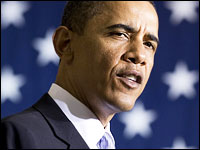
The Cyber Intelligence Sharing and Protection Act (CISPA), which faces a vote in the U.S. House of Representatives on Thursday, may end up vetoed by President Obama.
CISPA encourages private companies to share security information among themselves and with the government.
The House Rules Committee on Tuesday rejected a bipartisan amendment that would have seen Google, Facebook and other Internet companies and email providers remain legally liable for protecting users’ privacy.
The White House had earlier threatened to veto the bill unless it includes provisions to protect consumers’ privacy.
“Civil liberties can be protected, clearly and explicitly, while still making headway to combat the threat of cyberattacks,” said David Maass, a spokesperson for the Electronic Frontier Foundation, which is among 34 civil liberties organizations that wrote to House members urging them to continue opposing CISPA.
“I think the legislation is ill-conceived and doesn’t do anything to safeguard personal privacy,” Yasha Heidari, managing partner at the Heidari Power Law Group, told TechNewsWorld.
A spokesperson for Rep. C. A. “Dutch” Ruppersberger, who co-sponsored the bill with Rep. Mike Rogers, was not immediately available to comment for this story.
Privacy Protections and National Security
As it is currently worded, CISPA allows the sharing of cybersecurity information among companies and with the federal government.
“As it’s written now, it’s very broad and gives companies latitude to do what they want,” Heidari said.
Rep. Rogers’ position is that national security trumps other considerations, but “It’s not a matter of sacrificing the good in pursuit of the great, as Rep. Rogers suggested, but rather of putting in a little bit more work to make sure U.S. citizens’ privacy is thoroughly protected,” Maass told TechNewsWorld. “The public should not be satisfied by feeble accountability measures that serve as cover for politicians, but aren’t actually an accessible remedy.”
Companies already share information with the government when subpoenaed or when complying with the Patriot Act and other laws, Heidari said. “For people to come out and say this needs to be easier, and people should turn over all their privacy for safety concerns, is a way to try to circumvent the underlying issue.”
The technology industry is largely supporting CISPA. On Monday, IBM flew nearly 200 executives to Washington, D.C. to lobby Congress in support of the bill, and 36 members of Congress signed on as co-sponsors,MapLight’s Pamela Behrsin told TechNewsWorld. The new sponsors received 38 times as much money from CISPA backers — US$7.6 million — as they did from those opposing the bill — about $200,000.
The Chance of a Presidential Veto
Last year, the White House threatened to veto the first version of CISPA unless it was modified to include more privacy protections.
Ruppersberger has reportedly said a veto would be upsetting, but the sponsors would carry on.
CISPA passed the House on a bipartisan vote last year despite the presidential veto threat, but it was defeated by a filibuster in the Senate.
Possible Impact of a Veto
In addition to insisting on privacy protection, the White House wants to retain civilian oversight of the Internet and cyberspace, while CISPA seeks to give that authority to the National Security Agency (NSA). That proposal has garnered opposition because it is seen as giving the military control over civilian life.
The presidential veto threat “is a game changer, particularly in terms of how it will influence Democrats who are still sitting on the fence,” Maas said.
Four Democratic members of the House — Reps. Adam Schiff, Jan Schakowsky, Anna Eshoo and Rush Holt — circulated a letter on Monday calling for opposition to the bill before the Rules Committee voted, and it’s likely they’ll continue trying.
“Congress shouldn’t play chicken with the president; they should go back and do it right,” Mass said.
The veto “would bring more attention to this subject,” Heidari noted. “The average person doesn’t know much about this situation, and a presidential veto would hopefully shed more light on it and the average citizen would be outraged when they find out what this bill is doing.”





















































